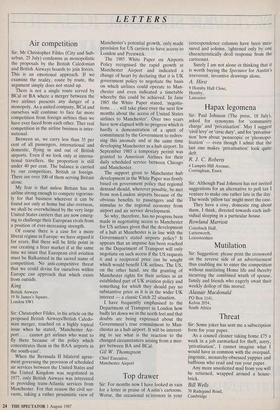Sir: Christopher Fildes, in his article on the proposed British
Airways/British Caledo- nian merger, touched on a highly topical issue when he stated, 'Manchester Air- port . . . cannot get airlines who want to fly there because of the policy which concentrates them in the BAA airports in the south-east'.
When the Bermuda II bilateral agree- ment governing the provision of scheduled air services between the United States and the United Kingdom was negotiated in 1977, only British Airways was interested in providing trans-Atlantic services from Manchester. For that reason the civil ser- vants, taking a rather pessimistic view of Manchester's potential growth, only made provision for US carriers to have access to London and Prestwick.
The 1985 White Paper on Airports Policy recognised the rapid growth at Manchester Airport and indicated a change of heart by declaring that it is UK government policy to negotiate the basis on which airlines could operate to Man- chester and even indicated a timetable whereby this could be achieved. In June - 1985 the White Paper stated, 'negotia- tions . . . will take place over the next few months about the access of United States airlines to Manchester'. Over two years have now elapsed with no progress which is hardly a demonstration of a spirit of commitment by the Government to redres- sing this anomaly and at the same time developing Manchester as a hub airport. In September 1985 a temporary permit was granted to American Airlines for their, daily scheduled service between Chicago and Manchester.
The support given to Manchester hub development in the White Paper was firmly based on government policy that regional demand should, wherever possible, be met from non-London airports because of the obvious benefits to passengers and the stimulus to the regional economy from airport and air service development.
So why, therefore, has no progress been made in negotiating access to Manchester for US airlines given that the development of a hub at Manchester is in line with the Government's stated airports policy? It appears that an impasse has been reached as the Department of Transport will only negotiate on such access if the US requests it and a reciprocal price can be sought which would benefit UK airlines. The US, on the other hand, see the granting of Manchester rights for their airlines as an established part of UK aviation policy and something for which they should pay no substantive price as it is in the wider UK interest — a classic Catch 22 situation.
I have frequently emphasised to the Department of Transport in London how badly let down we in the north feel and that doubts are being expressed about the Government's true commitment to Man- chester as a hub airport. It will be interest- ing to see what is the reaction to the changed circumstances arising from a mer- ger between BA and BCa1.
Gil W. Thomspson
Chief Executive, Manchester Airport


















































 Previous page
Previous page